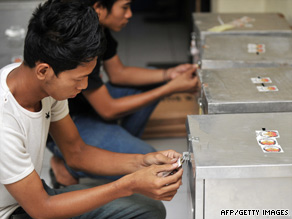
Indonesians head to the polls on Wednesday to elect their next president and vice president — only the second time such a vote has occurred in the young democracy’s history.
Three familiar faces are vying for the top spot: incumbent Susilo Bambang Yudhoyono; his vice president, Yusuf Kalla; and former President Megawati Sukarnoputri. Analysts and polls have Yudhoyono — riding high on the country’s economic strength — widely expected to win a second five-year term. “He has positive global image; relations with the American government have been the best in all the time that I have been here, the last 30 years,” said James Castle, who analyzes Indonesian politics and economy. “He’s very popular in the foreign community and, to be honest, if he’s not re-elected, the markets will react negatively for a month or so.” Yudhoyono’s Democratic Party was the only party to get enough votes in April’s legislative elections to nominate a candidate on its own. Kalla’s Golkar Party came in second and Megawati’s Indonesian Democratic Party of Struggle, or PDI-P, placed third. See a photo slideshow of Indonesians talking about who they will vote for » Kalla and Megawati had to form coalitions with other parties to run for president. It is the country’s second direct presidential election since the authoritarian regime of Suharto fell in 1998, in the wake of the Asian financial crisis. In the 2004 election, Yudhoyono defeated incumbent Megawati in a runoff.
Don’t Miss
Indonesia ready to give Obama a chance
Clerics: We don’t want to ban Facebook, we use it
Death toll in Indonesia plane crash reaches 99
Newlyweds turn back clock on deforestation
Yudhoyono is known as “Mr. Clean” because of his anti-corruption efforts. He has also gained popularity for his handling of the 2004 tsunami recovery and the country’s battle against terrorism. “I choose SBY (Yudhoyono), I feel like he knows what poor people like me feels like,” Taopiq Rachmat, a 21-year-old parking security guard, told CNN. “He has this same vision with me, a bright future of Indonesia, where people look at each other equally. He lowered the oil price, he tried his best to make his people happy. The direct cash aid was really helpful.” Indonesia has had impressive economic growth over the past five years, though how much direct credit Yudhoyono can take for that is questionable. And despite Indonesia posting an average of 5.9 percent annual growth during his presidency, little of that has trickled down to the country’s poor. One voter, a 25-year-old entrepreneur, said she would choose Kalla over the president to steer the economy during the global recession. “He is also an entrepreneur, he knows what is important for us,” said Juineti Nasution. “I know, in his hands, Indonesia will get a better future.” Yudhoyono’s opponents say he is too liberal, is too skewed toward the West, and doesn’t pay enough attention to the 40 million Indonesians living below the poverty line. Sakri, a 59-year-old street vendor, echoed those sentiments. “I think I should go with the bull (Megawati’s political party icon),” he said. “She understands poor people’s feeling. Basic needs prices were much lower under Megawati’s administration. I know SBY had lowered the oil price, but still he couldn’t keep up his promise to pull down the price of basic needs.”
Still, the country is exhibiting surprising resilience in the face of the global economic downturn. Growth topped 6 percent last year, and Indonesia was the fastest-growing economy in Southeast Asia in the first quarter of this year. “All of a sudden, everybody is contracting except for Indonesia,” Castle said. “We’ve had more visiting regional heads and so on in the last six months than we had in the last six years.”